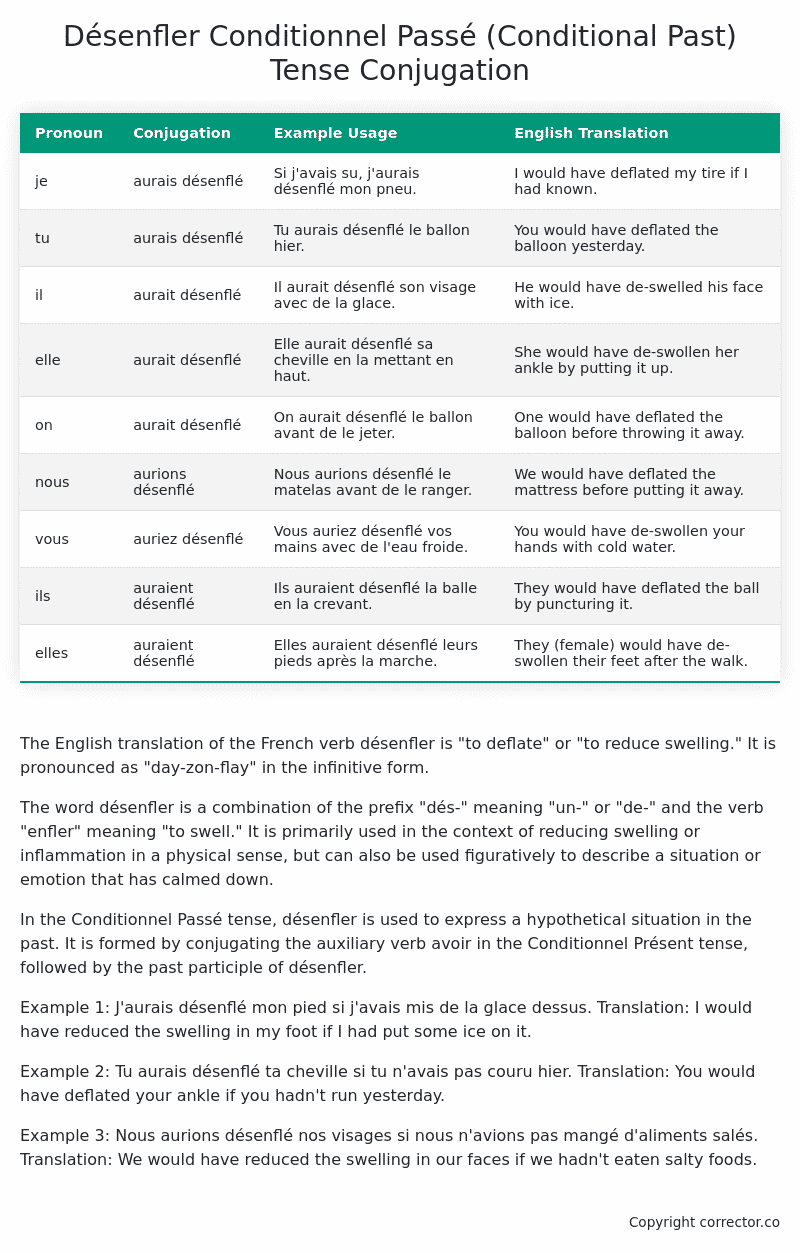Conditionnel Passé (Conditional Past) Tense Conjugation of the French Verb désenfler
Introduction to the verb désenfler
The English translation of the French verb désenfler is “to deflate” or “to reduce swelling.” It is pronounced as “day-zon-flay” in the infinitive form.
The word désenfler is a combination of the prefix “dés-” meaning “un-” or “de-” and the verb “enfler” meaning “to swell.” It is primarily used in the context of reducing swelling or inflammation in a physical sense, but can also be used figuratively to describe a situation or emotion that has calmed down.
In the Conditionnel Passé tense, désenfler is used to express a hypothetical situation in the past. It is formed by conjugating the auxiliary verb avoir in the Conditionnel Présent tense, followed by the past participle of désenfler.
Example 1:
J’aurais désenflé mon pied si j’avais mis de la glace dessus.
Translation: I would have reduced the swelling in my foot if I had put some ice on it.
Example 2:
Tu aurais désenflé ta cheville si tu n’avais pas couru hier.
Translation: You would have deflated your ankle if you hadn’t run yesterday.
Example 3:
Nous aurions désenflé nos visages si nous n’avions pas mangé d’aliments salés.
Translation: We would have reduced the swelling in our faces if we hadn’t eaten salty foods.
Table of the Conditionnel Passé (Conditional Past) Tense Conjugation of désenfler
| Pronoun | Conjugation | Example Usage | English Translation |
|---|---|---|---|
| je | aurais désenflé | Si j’avais su, j’aurais désenflé mon pneu. | I would have deflated my tire if I had known. |
| tu | aurais désenflé | Tu aurais désenflé le ballon hier. | You would have deflated the balloon yesterday. |
| il | aurait désenflé | Il aurait désenflé son visage avec de la glace. | He would have de-swelled his face with ice. |
| elle | aurait désenflé | Elle aurait désenflé sa cheville en la mettant en haut. | She would have de-swollen her ankle by putting it up. |
| on | aurait désenflé | On aurait désenflé le ballon avant de le jeter. | One would have deflated the balloon before throwing it away. |
| nous | aurions désenflé | Nous aurions désenflé le matelas avant de le ranger. | We would have deflated the mattress before putting it away. |
| vous | auriez désenflé | Vous auriez désenflé vos mains avec de l’eau froide. | You would have de-swollen your hands with cold water. |
| ils | auraient désenflé | Ils auraient désenflé la balle en la crevant. | They would have deflated the ball by puncturing it. |
| elles | auraient désenflé | Elles auraient désenflé leurs pieds après la marche. | They (female) would have de-swollen their feet after the walk. |
Other Conjugations for Désenfler.
Le Present (Present Tense) Conjugation of the French Verb désenfler
Imparfait (Imperfect) Tense Conjugation of the French Verb désenfler
Passé Simple (Simple Past) Tense Conjugation of the French Verb désenfler
Passé Composé (Present Perfect) Tense Conjugation of the French Verb désenfler
Futur Simple (Simple Future) Tense Conjugation of the French Verb désenfler
Futur Proche (Near Future) Tense Conjugation of the French Verb désenfler
Plus-que-parfait (Pluperfect) Tense Conjugation of the French Verb désenfler
Passé Antérieur (Past Anterior) Tense Conjugation of the French Verb désenfler
Futur Antérieur (Future Anterior) Tense Conjugation of the French Verb désenfler
Subjonctif Présent (Subjunctive Present) Tense Conjugation of the French Verb désenfler
Subjonctif Passé (Subjunctive Past) Tense Conjugation of the French Verb désenfler
Subjonctif Imparfait (Subjunctive Imperfect) Tense Conjugation of the French Verb désenfler
Subjonctif Plus-que-parfait (Subjunctive Pluperfect) Tense Conjugation of the French Verb désenfler
Conditionnel Présent (Conditional Present) Tense Conjugation of the French Verb désenfler
Conditionnel Passé (Conditional Past) Tense Conjugation of the French Verb désenfler (this article)
L’impératif Présent (Imperative Present) Tense Conjugation of the French Verb désenfler
L’infinitif Présent (Infinitive Present) Tense Conjugation of the French Verb désenfler
Struggling with French verbs or the language in general? Why not use our free French Grammar Checker – no registration required!
Get a FREE Download Study Sheet of this Conjugation 🔥
Simply right click the image below, click “save image” and get your free reference for the désenfler Conditionnel Passé tense conjugation!

Désenfler – About the French Conditionnel Passé (Conditional Past) Tense
Formation
Common Everyday Usage Patterns
Expressing Unreal Past Scenarios
Polite Requests or Suggestions
Expressing Doubt or Uncertainty
Interactions with Other Tenses
Conditional Present
Indicative Past Tenses
Conditional Future
Summary
Want More?
I hope you enjoyed this article on the verb désenfler. Still in a learning mood? Check out another TOTALLY random French verb conjugation!


